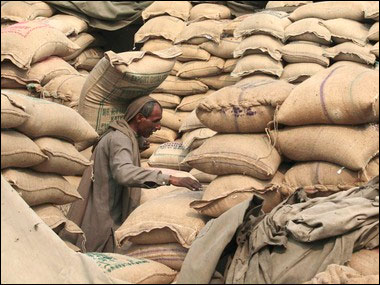 | « Back to article | Print this article |
A pension for the poor and elderly
Care of the elderly is not a new challenge. The mythic figure of 'Shravan', who performed selfless service to his blind and elderly parents, indicates an ideal that we have been striving for but perhaps having trouble in realising.
The condition of the elderly who are also poor is an even more acute tragedy in India. NGOs across the country are struggling to help abandoned and destitute elderly persons. So there is now a plan to create a government scheme of pensions to old people in the unorganised sector.
A Pension Parishad was held on April 2nd and 3rd at Tata Institute of Social Sciences in Mumbai to work on the details of the proposed pension scheme. It was attended by over one hundred 100 representatives from workers organizations in 20 states.
It is estimated that out of the 45 crore workers in the unorganised sector in India, about eight crore are elderly. Many of these people, after working all their lives, are left with neither family support nor any financial back-up on which to live the rest of their life.
Click on NEXT for more...
A pension for the poor and elderly
Dr Baba Adhav, the Pune-based activist and economist, says this campaign for claiming the right of pensions for the poor is a fight for basic social justice and against exploitation.
Dr Adhav, who has done extensive work among the unorganised workers for decades has also served as a member of the National Commission for Enterprises in the Unorganised Sector.
The organisations which met at TISS this week are now planning a dharna by the elderly at Jantar Mantar from the May 7 to 11. Participating organisations include: the National Federation for Indian Women, Ekal Nari Sangathan, Action Aid, Help Age India, Grameen Coolie Karnikara Santhan, National Alliance for Peoples Movements, NREGA unions, Kashtakari Sangathana and others.
According to a report by the National Commission for Enterprises in the unorganised Sector (NCEUS), there were about 423 million informal workers in India in 2005.
The National Sample Survey Organisation (NSSO) data shows that the share of 60+ population that was not fully economically independent for their day-to-day maintenance was about 65 per cent in India in 2004-05.
Click on NEXT for more...
A pension for the poor and elderly
Workers in the organised sector are eligible for a variety of social security schemes, such as the civil service pension system for government employees, gratuity and provident fund in the private sector. But the bulk of workers in the unorganised sector have little or no coverage.
The National Social Assistance Program (NSAP), set up in 1995, does provide some protections. But the spread and volume of benefits available through this program is not wide enough, say the organisers of the Pension Parishad.
So the key demand of the Pension Parishad is for the setting up of a national pension scheme with universal coverage - excluding only those who are income tax payers or who receive a pension from an entity in the organised sector.
This pension, says a statement by the campaign, must not be less than half the minimum wage of the state in which the person lives.
Individuals, rather than households will be eligible for this pension.
The statement goes on to say: "That the pension must not be dependent on any contribution from the worker as their lifelong work has been an unacknowledged contribution to the nation's economic growth and development."
Click on NEXT for more...
A pension for the poor and elderly
Economist Jean Dreze, who is also an active proponent of the Right to Food, said at the conclusion of the Pension Parishad that these demands are "reasonable and logical and will form a good basis for the campaign."
The meeting at TISS has also drawn strength from recommendations of a working group of the National Advisory Council, regarding the Unorganized Workers' Social Security Act (UWSSA) of 2008.
This group is of the view that all unorganised workers, including those who go in and out of the formal and informal sectors of the economy - such as contract labourers - must be brought under the ambit of the law.
They recommend that a minimum social security package must include - Life insurance and disability coverage, financial protection against ill-health, maternity benefits and pension upon retirement.
The NCEUS has already recommended a set of minimum social security benefits which would include: health insurance, maternity benefits, accident insurance, old age pension and provident fund. It was on the recommendations of the NCEUS, that the government of India enacted the Unorganized Sector Workers' Social Security Act in 2008.
This Act provides for the constitution of a National Social Security Board – a necessary precursor to the demands now being raised by the Parishad.
Click on NEXT for more...
A pension for the poor and elderly
However, this Act is deemed to be not strong enough to deliver what is needed on the ground. A report by the NCEUS has said that there is need for the central government to take the lead and put in place a countrywide social security framework, instead of relying on a whole spectrum of schemes which tend to get mired in problems of duplication, segmentation and incoherence -- with millions of people being left without any benefits.
But where is the money for such an ambitious scheme to come from? Proponents of universal pension coverage argue that India is now a rich country with a large population of poor people. So resources are available but not adequately channeled to those who need them.
There is clearly need for better coverage and protections to workers and elderly in this sector of the economy and society.
However, this would be a necessary but insufficient condition for ensuring care of the elderly - which is always depend on nurturing social and cultural strengths.




